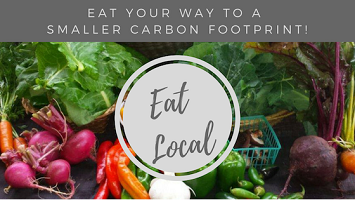It's early spring and the local farms have been planting and cultivating winter fruits and vegetables for months. Farmer's Market and CSA Season is about to start. Eating seasonally and locally can lower your carbon footprint.
About 10 years ago I started my path to a more sustainable life. After all of the easy fixes, my food carbon foot print was next. 8 years ago there was a movement to eat food sourced within 100 miles of your home. I jumped on that bandwagon! A whole new world of food opened up to me outside of what was available at my supermarket.  Different varieties of vegetables I had never experienced before, discovering I like some vegetables I had hated as a child since they only way they were served was out of a can. I remember the day clearly I had purchased a Cane Creek Farm CSA share from Cumming Local Harvest and it had Kohlrabi in it. My first reaction was what is this? Second was how to I serve it? Kohlrabi is now a family favorite.
Different varieties of vegetables I had never experienced before, discovering I like some vegetables I had hated as a child since they only way they were served was out of a can. I remember the day clearly I had purchased a Cane Creek Farm CSA share from Cumming Local Harvest and it had Kohlrabi in it. My first reaction was what is this? Second was how to I serve it? Kohlrabi is now a family favorite.
When I talk about the carbon footprint of food, the first thing that should be considered is the distance it travels, or “food miles”. You can reduce the carbon footprint of your food by up to 7% by eating locally. Food miles are only a small part of our food’s carbon emissions. To consider foods carbon footprint, you need to look at the whole story of our food. Sometimes, non-local food out of season may have a larger footprint you may realize. In fact, up to 83% of CO2 emissions come from food production, which mainly consist of growing and storing food.
If you can, choose sustainable food. While organic and sustainable products often sound synonymous, this is not always the case. Organic products consider mainly the aspect of human health, while sustainable practices take into account the economic, social, and ecological factors to ensure that we will continue to have the resources to protect the Earth.
So, how do you find sustainable food? While there is no sustainability label yet, there is always the farmers market, where you can find out the story of your food directly from the growers. If no sustainable option is available, organic food remains the second best choice as often it is grown in a more sustainable fashion than conventionally grown produce.
Forsyth County, Georgia Sustainable Food Sources
Cane Creek Farms (Spring Season Starts April 8, 2019)
Circle A Farms (local greens)
Cumming Local Harvest (local food co-op)
There are many more but I can say I use all three of these personally.
Happy Eating your way to a smaller footprint!

